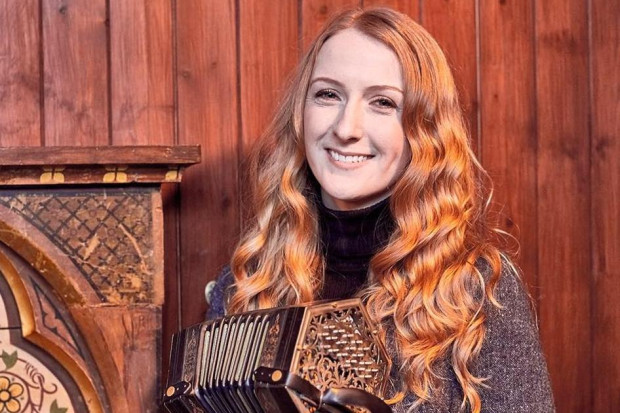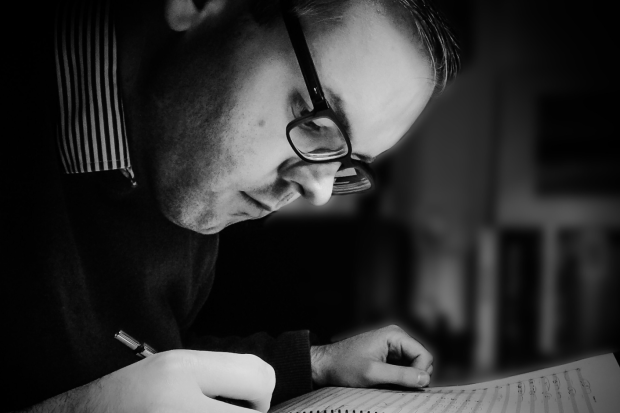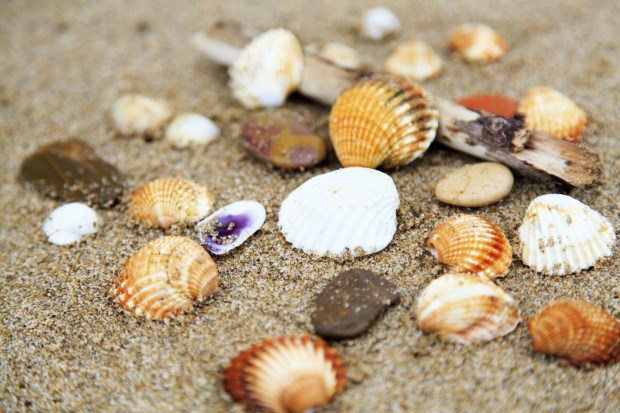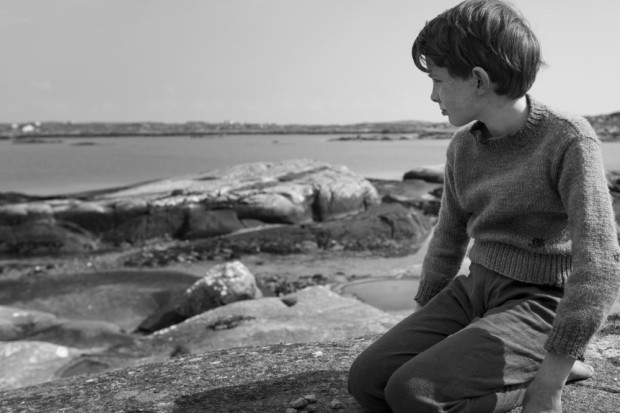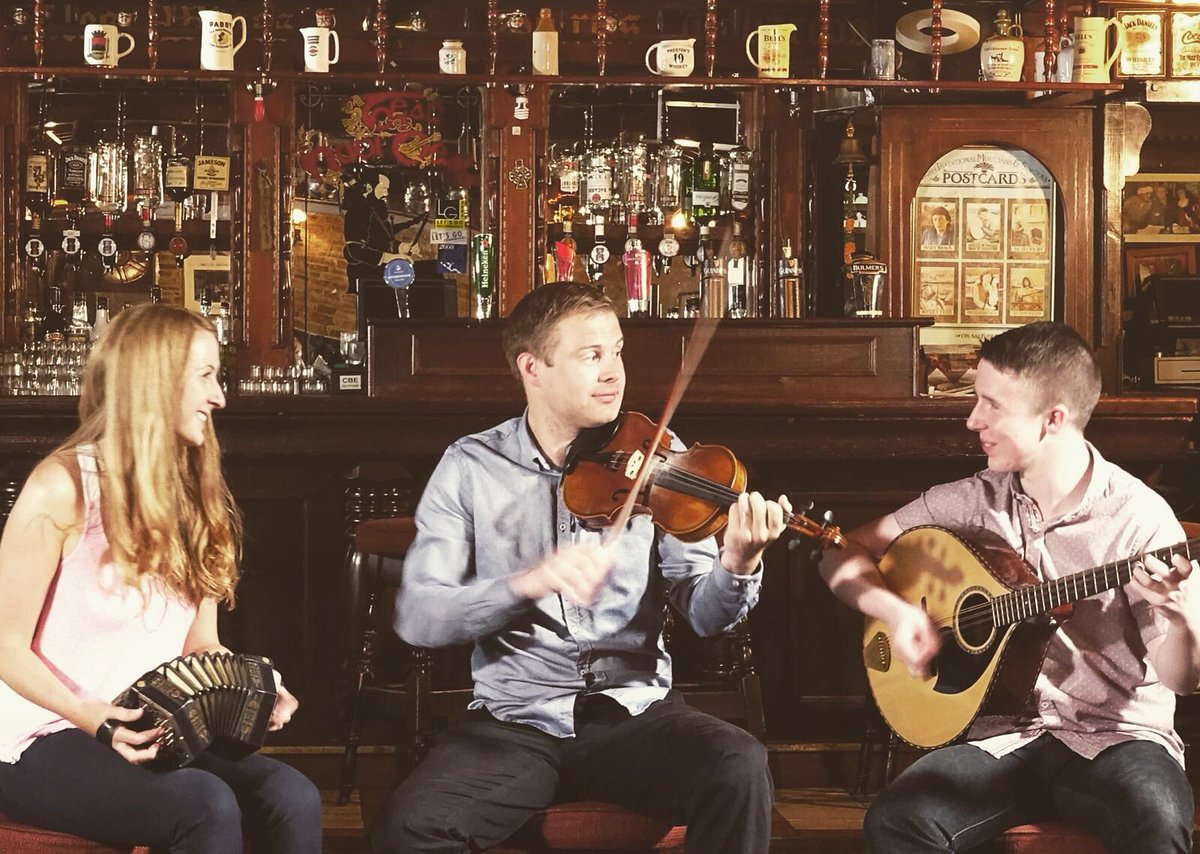
The High Seas trio: Caitlín Nic Gabhann, Ciarán Ó Maonaigh and Cathal Ó Curráin
A High-Wire Act
In the summer of 2012, Caitlín Nic Gabhann’s debut concertina album was my soundtrack for the week of the Willie Clancy Summer School. The motoring rhythm, the punchy melodic playing, a roll of tunes that you felt you had to learn one day, it was perfect for the road to Spanish Point every morning.
Three years later, her duet recording with Donegal fiddle-player Ciarán Ó Maonaigh brought another classic track to the summer. The opening set of Caitlín & Ciarán begins with the gentle swing of ‘Mammy’s Plaidie’, then erupts into the ‘Boyne Hunt’ and leaps into ‘Jerry Holland’s’. There is always a fiery element where Ó Maonaigh is involved, and, combined with Nic Gabhann’s propulsive playing, we get a real sense of the kick this duo is capable of.
Nic Gabhann, from Meath, is also an extremely good dancer, and her ‘foot percussion’ regularly features on her recordings. Does dance explain why the rhythm in her playing is so striking? It must be part of it.
As Ó Maonaigh’s playing has developed – he has recorded a solo album, three recordings with the group Fidil, and another with his family group, The Mooneys – he seems to be channelling even more of the mid-twentieth century Donegal fiddle players Mickey and John Doherty. It is at times feverish music, with little made of the technical challenges. It is always about something more.
Nic Gabhann and Ó Maonaigh have now joined with Donegal singer and bouzouki player Cathal Ó Curráin to form a trio called The High Seas. Their first album, released with the help of crowdfunder Pledge Music, contains five songs and six instrumentals.
Sweet-toned and unadorned
‘Níl Cailín Óg Níos Deise’ (There isn’t a nicer young girl) introduces the trio. A song written for Ó Curráin’s grandmother by a lover who emigrated, the lyrics were found under her bed after she passed away. The song showcases Ó Curráin’s voice as gentle, sweet-toned and quite unadorned – similar at times to the Northern singer Albert Fry. Ó Maonaigh and Nic Gabhann mainly shadow the melody, accompanying him with simple lines and long notes underneath, rarely playing too much with the rhythm or harmony. It is interesting to compare this approach with the lavish, sophisticated arrangements of Albert Fry’s 1979 collection of Donegal songs (which features a teenage Mairéad Ní Mhaonaigh – Ciarán’s aunt – on fiddle). The Fry collection was on a label, Gael Linn, but traditional albums today, often reliant on independent funding, perhaps have less time for working through intricate song harmonies and arrangements. It is also that there is a move away from it – raw and stripped-down is in vogue, but there is room for both.
The instrumental tracks seem to attract more attention. ‘Éigse an Spidéil’, a barndance composed by Nic Gabhann, begins with long, introductory high-pitched tones on concertina with fiddle below. She begins the tune with incisive triplets and Ó Maonaigh introduces a wave of drones. From there it begins to intensify until Nic Gabhann takes a hockey-stick turn into the fast reel ‘Come West Along the Road’. Ó Maonaigh’s vigorous double-tracked playing – like a hound out of a trap – helps reproduce the kind of classic moment that made tracks on the last album so exciting.
There is no complete set of solo tunes from Nic Gabhann, and you would miss it because she begins several sets, establishing her exact, compelling rhythm. In Ó Maonaigh’s solo set – a strathspey and two reels: ‘Stirling Castle’, ‘The Lowland’s of Scotland’ and ‘Mooney’s Reel’ – each piece intriguingly brings about a different aspect of his musical personality, and quite radically changes in tone with each piece. The first is playful and rough, the second he almost absents himself from the melody, and the third he applies his characteristic intensity. It’s like a personal, musical search.
Hire-wire act
When the three play together, on tunes such as ‘Christmas Eve’, there can be real energy, almost elation, but it is a high-wire act. Such is the spontaneous nature that some details don’t come off. Ó Maonaigh has constant inventive ideas – a trill in the above tune, a twist in the melody in the second part of ‘The Drunken Landlady’ – but then he may repeat it and it loses its effect.
‘The Road to Donegal’ is perhaps the strongest song on the album – Ó Curráin capturing the affection for the county that is all over the song’s lyrics, and key to this trio – ‘Would you hurry said the driver, we can make the boat on time / The crossing it was easy, soon Glenshane we did climb / From Dungiven on to Derry, and around by Inishowen / Just a few more miles then we’ll soon be home.’
Ó Maonaigh and Nic Gabhann are always exciting to hear – and a trio with Ó Curráin is worth listening out for. The highlight is ‘Éigse an Spidéil’ yet there are other musical boiling points here. They may be fleeting, but there is not too many other sets of musicians who can reproduce them.
For more, visit www.caitlin.ie/thehighseas
Published on 31 May 2018
Toner Quinn is Editor of the Journal of Music.













